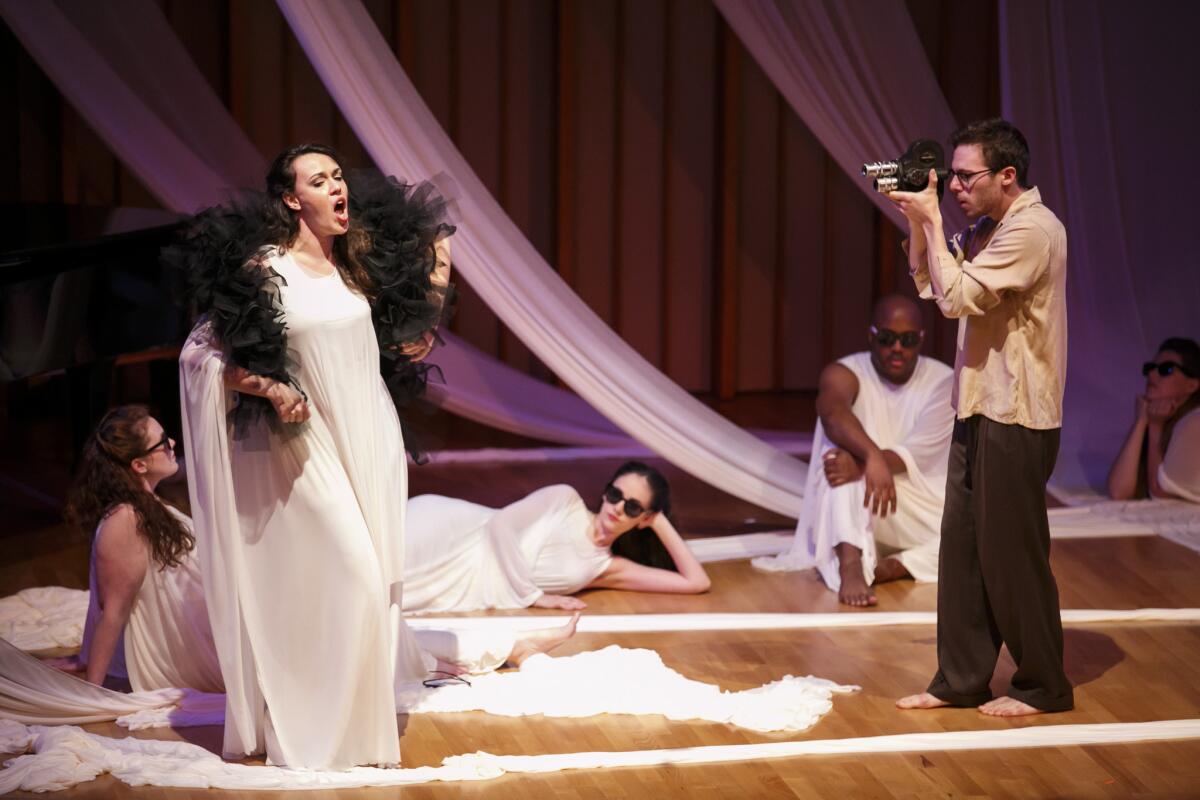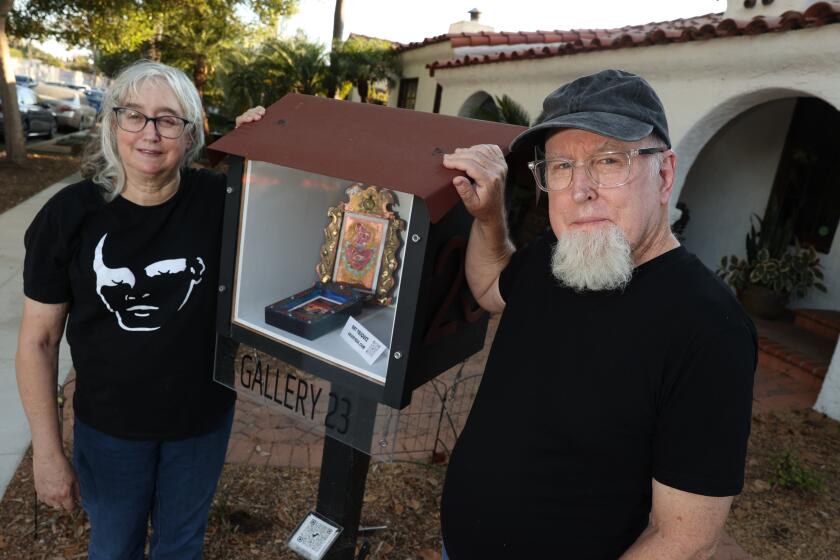Review: Eisler’s ‘Hollywood Songbook’ comes home, bad mood and all

We ignore, irresponsibly, Hanns Eisler.
The German composer, who died in 1962 in what was then East Berlin, has but few champions in Europe, and fewer still in high places. Russia pays him no mind, although the lifelong leftie did write a requiem for Lenin, a very good one. A Los Angeles emigre in the 1940s, Eisler is ignored by Hollywood despite having composed some of the most significant film music of the decade, especially his score for Fritz Lang’s “Hangmen Also Die,” and receiving two Academy Award nominations.
Most ignorant of all is the neglect of Eisler’s “The Hollywood Songbook,” a cycle of 46 songs begun in a Hollywood hotel in 1942 and completed the following year. His collaborator was his difficult close friend, playwright and poet Bertolt Brecht, then living in Santa Monica in a very bad mood. Brecht hated Hollywood. Eisler tried unsuccessfully to make peace with it. The result is a masterpiece that, in speaking of its time, offers disquieting relevance to our own.
As far as I can tell, “The Hollywood Songbook,” never performed complete in Eisler’s lifetime, had only been given in excerpts in Hollywood and its environs until Wednesday night. SongFest, the monthlong training program at the Colburn School for young singers in the art of the recital, finally took the whole cycle on, staging it as an exercise for seven singers and two pianists in the program.
Eisler, himself, did manage to get quite a bit of ink in The Times. “After Hanns Eisler finagled his way into this country, he composed the music for 11 films since 1939,” Hedda Hopper began a Looking at Hollywood column in 1947. For the gossip columnist notorious for naming names of suspected communist sympathizers, this was nothing more than taking jobs away from Americans. “Maybe they didn’t have the right connections,” Hopper concluded. “Mr. Eisler didn’t seem to suffer.”
Mr. Eisler — and, especially, Mr. Brecht — did suffer. As German emigres, they suffered as they helplessly observed from afar their homeland, family, friends and culture devastated by the Nazis. They suffered the commercialism of Hollywood. They suffered collectively the offense of Golden Age Hollywood as America’s most offensive symbol of extreme income inequality.
Ultimately, they suffered the persecution of left-wing foreigners. Brecht fled before he was hounded out of the country. Eisler was deported by the House Un-American Activities Committee. Both went to East Germany.
“The Hollywood Songbook” almost could have been written yesterday. It is a chronicle of affliction caused by involuntary immigration, by income inequality, by political oppression, by war. It is bitter. It is sardonic. It looks at all that is beautiful in L.A. — the climate, the ocean, the fresh fruits and vegetables — as having an inner toxicity. Paradise is hell when beauty belongs to the rich, who, Brecht complains, are also profligate in their waste of water.
And yet, through all the negativity, social protest and anger, “Hollywood Songbook” reveals an extraordinary amount of compassion.
Eisler’s music offers no false hope. But the spiteful harmonies and warlike rhythms of his songs also have hidden beauties as the other side of the musical coin. Besides Brecht’s songs, Eisler sets texts by classic German poets to give the whole thing a broader German context.
The concept behind Edwin Cahill’s staging of “The Hollywood Songbook” in Zipper Hall was to organize the songs by themes and create a dramatic context of a young, struggling singer coming to Hollywood and trying to make it in a foreign land. His nightmares evoke Hollywood ghosts, which means everyone but baritone Jeremy Hirsch is clothed in flowing draperies, which isn’t a particularly flattering way to treat the young SongFest singers. Along with the translations of German-language songs on an overhead screen were master scene headings, as if this were a film script being enacted.
Little works, mostly trivializing the very real horror expressed. The staging has, unlike the Hollywood careers of Eisler and Brecht, a frivolous happy ending. But even so, the performances by Kristina Bachrach, Phoebe Haines, Deborah Rosengaus, Heather Witt, Christian Bester and Jorell Williams as the ghosts were uniformly impressive. Hirsch proved a compelling actor and singer. The pianists Javier Arrebola and Katelan Terrell were properly forceful.
Eisler and Brecht, and our times, may deserve something more thoughtful theatrically, but musically “The Hollywood Songbook” finally came home where it belongs.
More to Read
The biggest entertainment stories
Get our big stories about Hollywood, film, television, music, arts, culture and more right in your inbox as soon as they publish.
You may occasionally receive promotional content from the Los Angeles Times.











